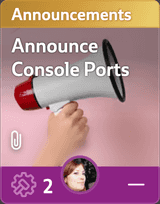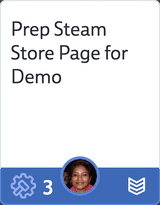
Nada is a marketing intern at Codecks and has a diverse background as a Moroccan who has lived in 3 different countries throughout her studies. Recently, she successfully obtained her bachelor’s degree in business management, with skills acquired through both corporate and humanitarian experiences. She is simply curious, motivated, and eager to learn!
Codecks is a project management tool inspired by collectible card games. Sounds interesting? Check out our homepage for more information.
8 Best Project Management Tools for Game Development (The Ultimate List)
Embarking on a game project? That means that you’ll be dealing with one of the most complex development processes in the world. You’ll be on the bleeding edge of art, code, design and marketing. Even as a solo dev managing the complex interactions between these can be overwhelming and you might want to use a tool that helps you stay organized. Once you start growing a team and deal with complex dependencies and information flows between team members, using a dedicated tool becomes a necessity.
But choosing the right tool is not easy. Adopting a new software takes time and effort and you don’t want to make the mistake of choosing a tool that is either too simple or too complex for your situation. The transaction costs of moving to a new application can be quite painful (even if worthwhile for the right choice).
To help you on this big question we’ve looked at 8 common project management choices for game devs and compared them for you. These tools are used by solo devs and by big teams alike. We’ll compare their feature sets and suitability for different team scales, so that you’ll hopefully have an easier time what the right tool is for you.
What is project management in game development?
Let’s first analyze what typical goals are associated with project management in video games:
- Tracking development tasks
- Tracking milestone deliveries (e.g. game launches or publisher deliverables)
- Facilitate collaboration and efficient communication between team mates
- Documenting game design docs, reports and decisions
- Tracking and triaging bug reports and feedback
These goals shift based on the current stage of your game development project. Here are the six stages through which most video game projects go:
-
Planning and conception During the conceptualization phase, developers brainstorm ideas, themes, and gameplay mechanics. This is also the time to do competitor and target group analysis. A lot of game developers use game jams to come up with new game ideas (especially interesting for smaller mechanical games).
Main Project Management Duty: Documenting and collecting game design ideas
-
Pre-production Once a game concept is picked up, pre-production starts. This phase of the project is about exploration. Do the game mechanics hold up as envisioned? How is the asset pipeline constructed? In this phase developers try to answer any open technical and creative questions, which could endanger the project in later phases and so that the production phase can happen as smoothly as possible. This is the phase in which game developers will often seek out publishers for additional resources. How to pitch to publishers.
Main Project Management Duty: Tracking development tasks
-
Production With the groundwork laid, production is where most of the development time is spent. Developers start creating all the required game assets and building out the missing non-critical features, which were relegated to this phase (e.g. the credits screen, main menu). Ideally the pre-production phase has allowed to collect enough metrics about how long different types of assets take to build, so that a reasonable estimates can be done about the total game production length.
Main Project Management Duty: Tracking asset pipelines and dependencies
-
Quality Assurance and Polishing The final stage before releasing the game involved rigorously testing the game for bugs (often employing external QA studios) and fixing the often hundreds of remaining bugs, glitches, and balancing issues.
Main Project Management Duty: Tracking bugs and triaging
-
Launch The culmination of hard work arrives with the game’s launch. As this point all assets and features will have to be in a shippable state. When working with a publisher various milestone deliveries will have to have been tracked throughout the project.
Main Project Management Duty: Tracking milestone deliveries
-
Post-Release (i.e. patches and DLCs) However, this is not the end but the beginning of a new chapter. Developers continue to gather player feedback, release updates, and patches, ensuring the game remains engaging and enjoyable. Community engagement is vital for fostering a loyal player base.
Main Project Management Duty: Collecting community feedback
As seen above the focus and priorities shift with every stage of development. That’s why a versatile project management tool that can support you throughout all of these phases is so important to get right.
So let’s dive right in and review how well these 8 project management tools do across these areas.
What is the best game development project management software?

#1 Codecks
First on the list is Codecks, a project management tool distinguished for its unique design and pragmatic approach. It combines both project and community management in one site. Its motto is to work playfully, as it was conceived by game developers for game developers.
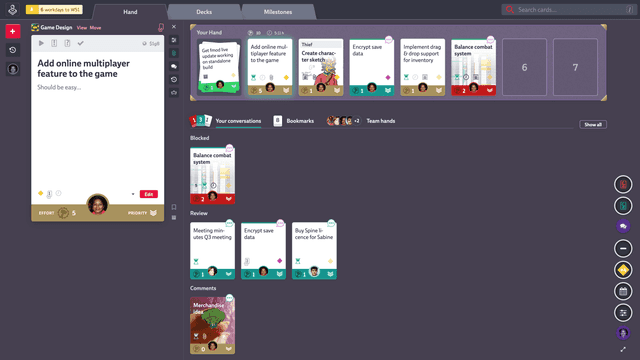
🦾 Task Tracking
Codecks uses a pragmatic battle-proven workflow model that is inspired by many years of real-world game dev experiences by it’s development team that worked on games like Spec Ops: The Line, Dead Island 2, Curious Expedition and more.
The playful visual design is inspired by trading card games, since this metaphor is not only easy to grasp and conveys a lot of information, but also makes the app feel more welcoming to the whole team, not only embracing the techies on the team, but all disciplines with a intuitive, yet powerful production system.
Cards in Codecks support estimations, milestones, conversations, pipelines (so called Journeys), dependencies, community management and more out of the box. The development team put a big focus on providing all the features required for game production across all stages in one single package.
📖 Document Handling
Documents are first-class citizens in Codecks. Cards can be marked as “doc cards”. Links and back links allow to build complex wiki structures without having to use additional tools. This makes it easier to collaborate on tasks since documentation and tasks can be kept on the same platform.
🔌 Integrations
Codecks is completely focused on being the best platform for game devs, so it’s integrations are focused on the tools that game devs used. In contrast to other tools on this list it offers a strong discord integration that allows to collect feedback and bug reports from your discord community.
In addition it offers unique Unity and Unreal5 plugins that collect bugs right from your game. Of course several other integrations like Slack, Github, Gitlab etc. are also available.
💰 Pricing Model
| Plan | Free | Plus | Pro | Enterprise |
|---|---|---|---|---|
| Price/User/Month | 0€ | 5€ | 9€ | 15€ |

#2 Trello
Second on the list is Trello, which most of you must already be quite familiar with, given its popularity if you’re looking for a Kanban board-oriented project management tool.
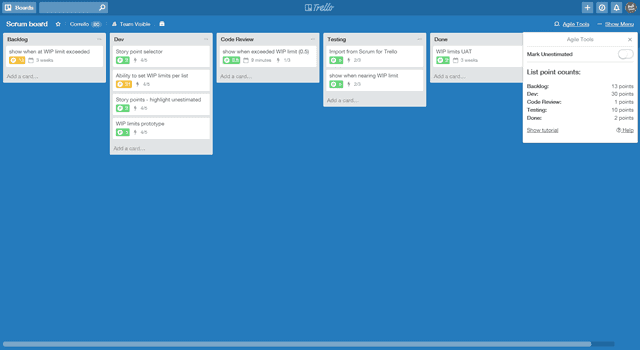
🦾 Task Tracking
Trello is excellent for small projects that don’t require advanced planning technics like estimation or milestones. It popularized the famous Kanban board and allows to get quickly started. It is not a great project management tool though since it’s tasks don’t support many features that are required for more complex projects. A lot of additional abilities can be unlocked via power plug-ins, but often these are created by third parties and can interfere with each other or be hard to set up.
📖 Document Handling
Trello does not provide explicit support for documents. Due to the flexible Kanban setup, cards can be made to represent documents, but navigating between related cards can be tricky, especially if they spread out across different boards.
🔌 Integrations
As one of the most popular choices on this list, trello offers the biggest range of integrations and plugins. Some of these have to make up for limitations in trello’s own feature set and are fundamental for tracking complex projects.
💰Pricing Model
| Plan | Free | Standard | Premium | Enterprise |
|---|---|---|---|---|
| Price/User/Month | $0 | $5 | $10 | $17.50 |

#3 Jira
Jira is a widely used software development and project management tool developed by Atlassian. It has a heavy preference towards team working in “scrum” development process and provides a extreme level of customizability for people who can afford the time to invest in it’s onboarding.
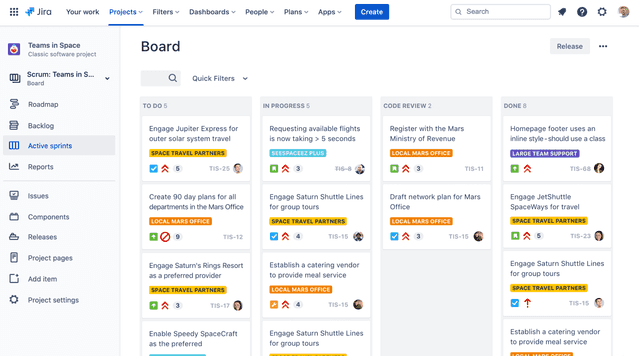
🦾 Task Tracking
Jira is known for its scalability and is designed to handle projects of massive sizes in large enterprises. This enterprises usually have a strong bias towards establishing lots of rules and processes to get work done. Accordingly Jira excels in allowing to set up various rail guards and to design very precise workflow models.
📖 Document Handling
Jira has a strong focus on task tracking and does not provide a native document handling solution. It does integrate well into Confluence, another application by Atlassian, that allows to build company wikis. Bridging the gap between these two platforms is well integrated into Jira, but not as easy as having everything on one platform.
🔌 Integrations
As a popular choice for enterprises Jira offers a vast amount of integrations from various third-party providers. This allows Jira to be used in many different scenarios: from software development, to sales agencies and service providers.
💰Pricing Model
| Plan | Free | Standard | Premium | Enterprise |
|---|---|---|---|---|
| Price/User/Month | $0 | $7.75 | $15.25 | Request is mandatory |

#4 HacknPlan
HacknPlan is the only other tool - aside of Codecks - that has been specifically designed for game development.
🦾 Task Tracking
Hacknplan offers a wide range of task tracking capabilities including effort estimation and milestone planning. It offers everything that most game development teams will need for complex game projects. In contrast to Codecks it uses a more classical business app presentation.
📖 Document Handling
One of Hacknplan’s stand-out features is it support for a unique game design document metaphor that allows to link specific parts of the document to tasks. This favors teams that like to work with big monolithic game design documentation for their games.
🔌 Integrations
Hacknplan is one of the smaller companies on this list and therefore doesn’t provide as many integrations as other options.
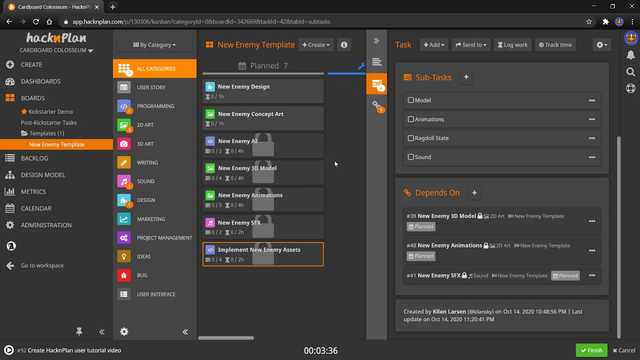
💰 Pricing Model
| Plan | Personal | Personal Plus | Studio | Educational |
|---|---|---|---|---|
| Price/User/Month | 0€ | 5€ | 8€ | Request is mandatory |

#5 Notion
Notion is a flexible work tool that has gained significant popularity in recent years. Notion provides a visually appealing and intuitive interface that allows users to create and organize content in various formats.
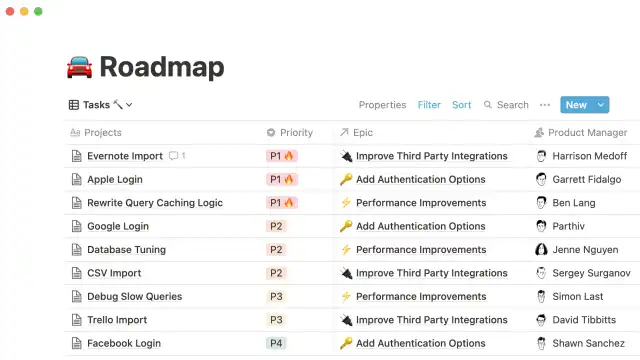
🦾 Task Tracking
Notion provides task tracking capabilities, but since project management is not it’s primary purposes, it does not provide the same ease of use when used for that purpose. It’s extensive customizability allows to build complex workflow representations, but often these can feel a bit alien to Notion’s structure or suffer from performance issues when dealing with extensive databases or complex pages.
📖 Document Handling
This is the core of Notion’s identity and accordingly Notion offers the best document handling out of all the options on this list. It allows to create beautiful documents in a powerful full-screen editor that can be extended with various extra capabilities, like image galleries or look-up tables.
It also offers a vast template gallery that allows to get started with various document formats, from sales overviews to personal gratitude journals.
💰 Pricing Model
| Plan | Free | Plus | Business | Enterprise |
|---|---|---|---|---|
| Price/User/Month | 0€ | 8€ | 15€ | Request is mandatory |

#6 Monday
Monday is a cloud-based enterprise project management and collaboration tool that aims to support teams across various industries and work areas, making it their central Work OS.
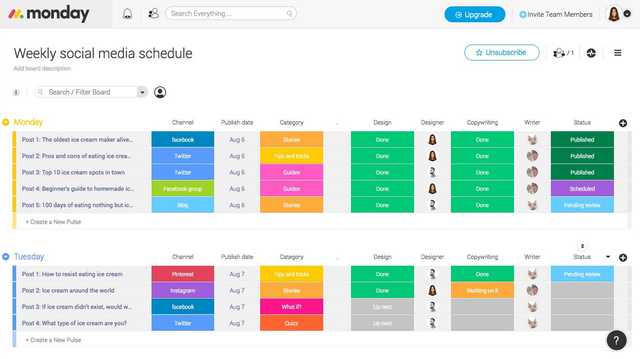
🦾 Task Tracking
Monday offers capabilities beyond project management, including CRM, marketing, and order tracking, making it highly scalable. Nontheless it’s task tracking capabilities are extensive and powerful and fall short only of enterprise tools like Jira.
🔥 Document Handling
Monday’s work docs offer a dedicated space for extensive documents, similar to Codecks Doc Cards, Hacknplan Design System and Notion’s page editor. In contrast to Jira, work docs can used interchangeably without having to use a separate system.
🌐 Integrations
Monday offers a vast range of integrations that allows to integrate into tools that are specific to different industries, including marketing or sales. It does not offer a lot of game development focused integrations though.
💰 Pricing Model
| Plan | Free | Basic | Standard | Pro | Enterprise |
|---|---|---|---|---|---|
| Price/User/Month | 0€ | 8€ | 10€ | 16€ | Request is mandatory |

#7 ClickUp
ClickUp is a versatile project management tool that’s generalist but may hold certain potential for game developers.
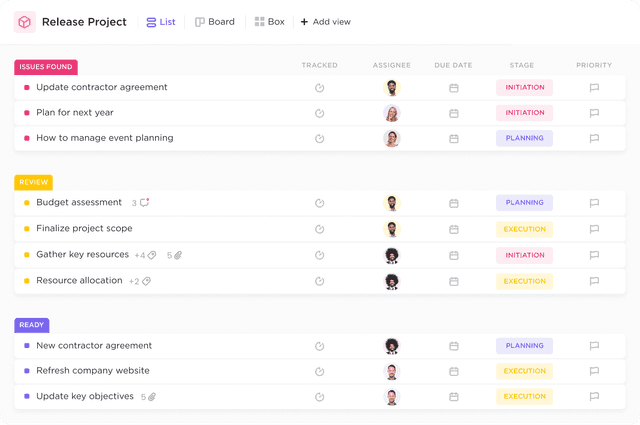
🦾 Task Tracking
Similar to Monday, ClickUp aims to build a extremely versatile software suite that can be applied to various industries and use cases. It offers a vast range of project management tools out of the box, supporting small and big teams.
📖 Document Handling
Clickup offers documents that are very similar to Notion’s foundation, while offering a bigger focus on extensive task tracking capabilities out of the box. It is possible to build complex wiki structures in Clickup.
🔌 Integrations
ClickUp’s already powerful offering can be extended by a large range of plugins that support teams across many use cases and processes. In terms of game development-focused integrations it may fall behind Codecks though.
💰 Pricing Model
| Plan | Free | Unlimited | Business | Business plus |
|---|---|---|---|---|
| Price/User/Month | $0 | $5 | $12 | $19 |

#8 YouTrack
Youtrack is developed by JetBrains, YouTrack a popular provider of programmer-aiding editor integrations.
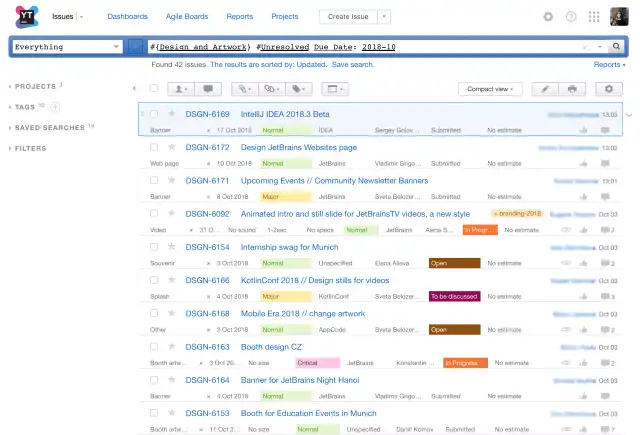
🦾 Task Tracking
YouTrack offers a good level of task tracking capabilities that allow software teams and other industries to model complex projects. Like other tools on the list it is aimed at team using an agile development process.
📖 Document Handling
YouTrack is mostly focused on providing excellent task tracking and does not have a big focus on providing an easy way for handling documents. For document tracking other tool’s like Notion are better suited.
💰 Pricing Model
| Number of users | 1-10 | 11+ |
|---|---|---|
| Price/User/Month | Free | $3.93 |
How to choose the right project management tool for your game development project?
In short, each of these project management tools offer a lot of shared capabilities, but yet aim for different target groups and audiences. For small to mid-sized games companies (up to 100 people) we recommend using Codecks or Hacknplan, as these are the only tools whose feature set was specifically built around satisfying game developers. Therefore a lot of tedious customization and onboarding costs are significantly reduced when compared to platforms that are aimed at other industries or large enterprises with rigid processes.
Trello and Notion can pose good alternatives for solo devs that don’t require extensive task management and whose day is spent wearing a lot of different hats. For these folks using a platform that allows to quickly set up a one-time-use dedicated board or a new document might be more enticing than Codecks’ unique community building integrations.
| Platform | Task Tracking | Documents | Integrations | Easy to learn |
|---|---|---|---|---|
| Codecks | 👍 | 👍 | 👍* | 👍** |
| Trello | 👍 | 👍 | ||
| Jira | 👍 | 👍 | ||
| HacknPlan | 👍 | 👍 | 👍 | |
| Notion | 👍 | 👍 | 👍 | |
| Monday | 👍 | 👍 | 👍 | |
| ClickUp | 👍 | 👍 | 👍 | |
| YouTrack | 👍 | 👍 |
* Unique game development integrations like discord feedback bot, Unity and Unreal plugins.
** Unique playful trading card game metaphor.
For very large teams that are working on AAA production, Jira has become the industry standard and remains a solid and safe choice.
Ultimately any project management tool is only as powerful as it’s users willingness and capability to learn and adapt it across the whole team. Don’t settle for a subpar tool, and choose wisely to unleash the true potential of your game project and team.

